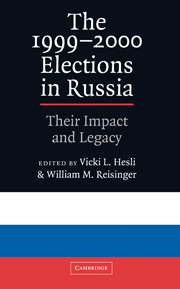12 - The 1999–2000 Elections and Russia's Prospects for Democracy
Published online by Cambridge University Press: 23 October 2009
Summary
It is appropriate to conclude this volume on the 1999–2000 elections by bringing together and commenting on the insights into Russian democratization that the preceding chapters provide. Of course, one can assess democracy from many angles. I find it useful to organize the multitude of competing definitions of democracy into three categories and to examine Russia from each perspective rather than from a single one. These are the minimalist standard of elite competition, the pluralist vision of elite-guided participation, and the republican view of deliberative democracy. (For another recent review of the meanings of democracy, see Huber, Rueschemeyer, and Stephens 1997.) Because the contributions to this volume cover such diverse ground, much light is shed on democracy from all three perspectives.
Thanks to analyses such as those in the preceding chapters, we now have a much clearer picture of Russia's politics – its parties, center-periphery relations, instruments of elite power, and public values – than we had a decade ago. Yet this picture draws our eye less to Russian democracy's accomplishments than to the tough road ahead of it. The actual conduct of these elections and of the campaigns preceding them bears some but far from all of the blame. Careful study of these elections, though, reveals political trends of some concern. Yes, the Russian polity in the Putin era is electorally competitive, and this situation is unlikely to change in the near future. Even so, Russia evinces little democratic dynamism.
- Type
- Chapter
- Information
- The 1999–2000 Elections in RussiaTheir Impact and Legacy, pp. 261 - 274Publisher: Cambridge University PressPrint publication year: 2003

